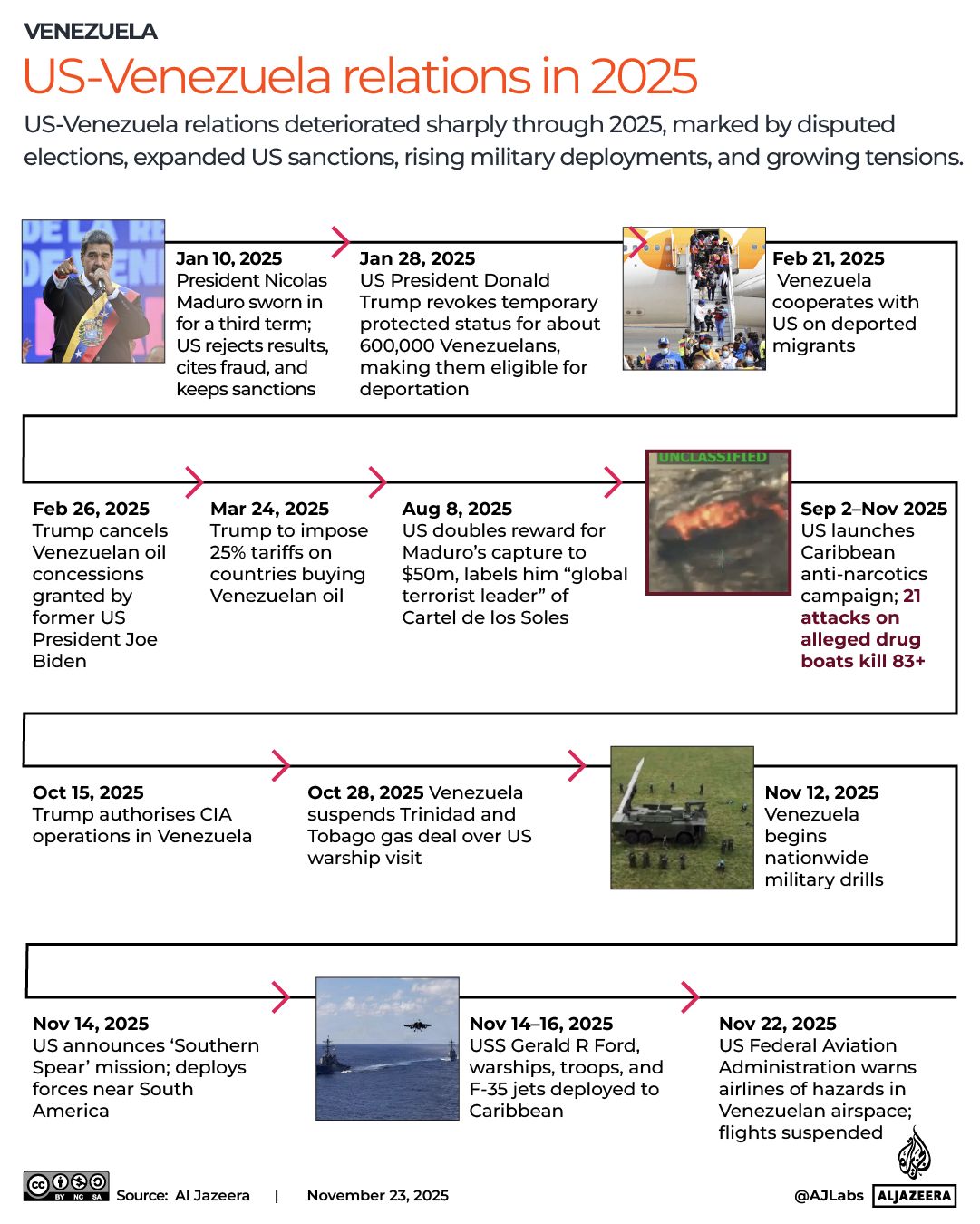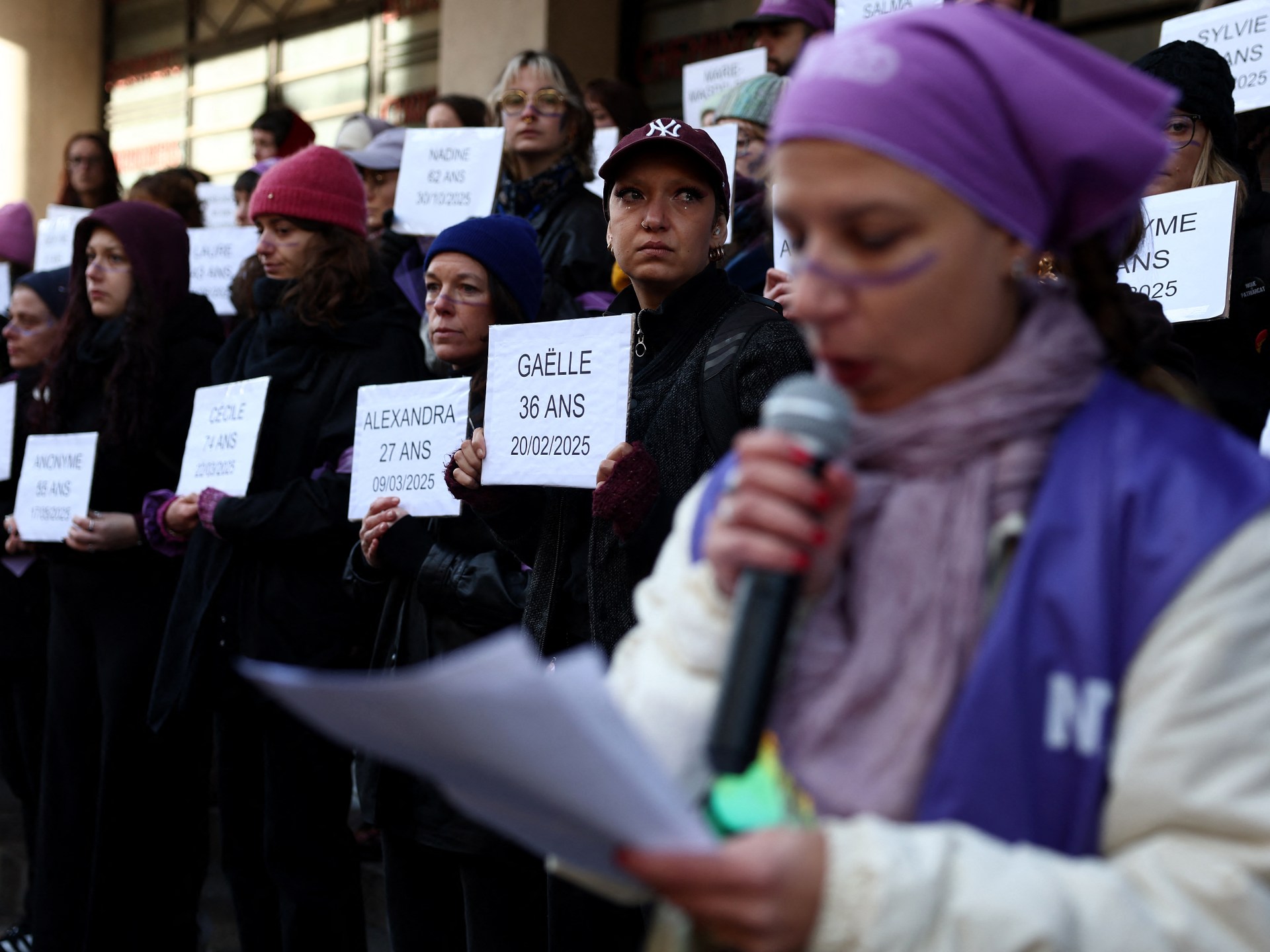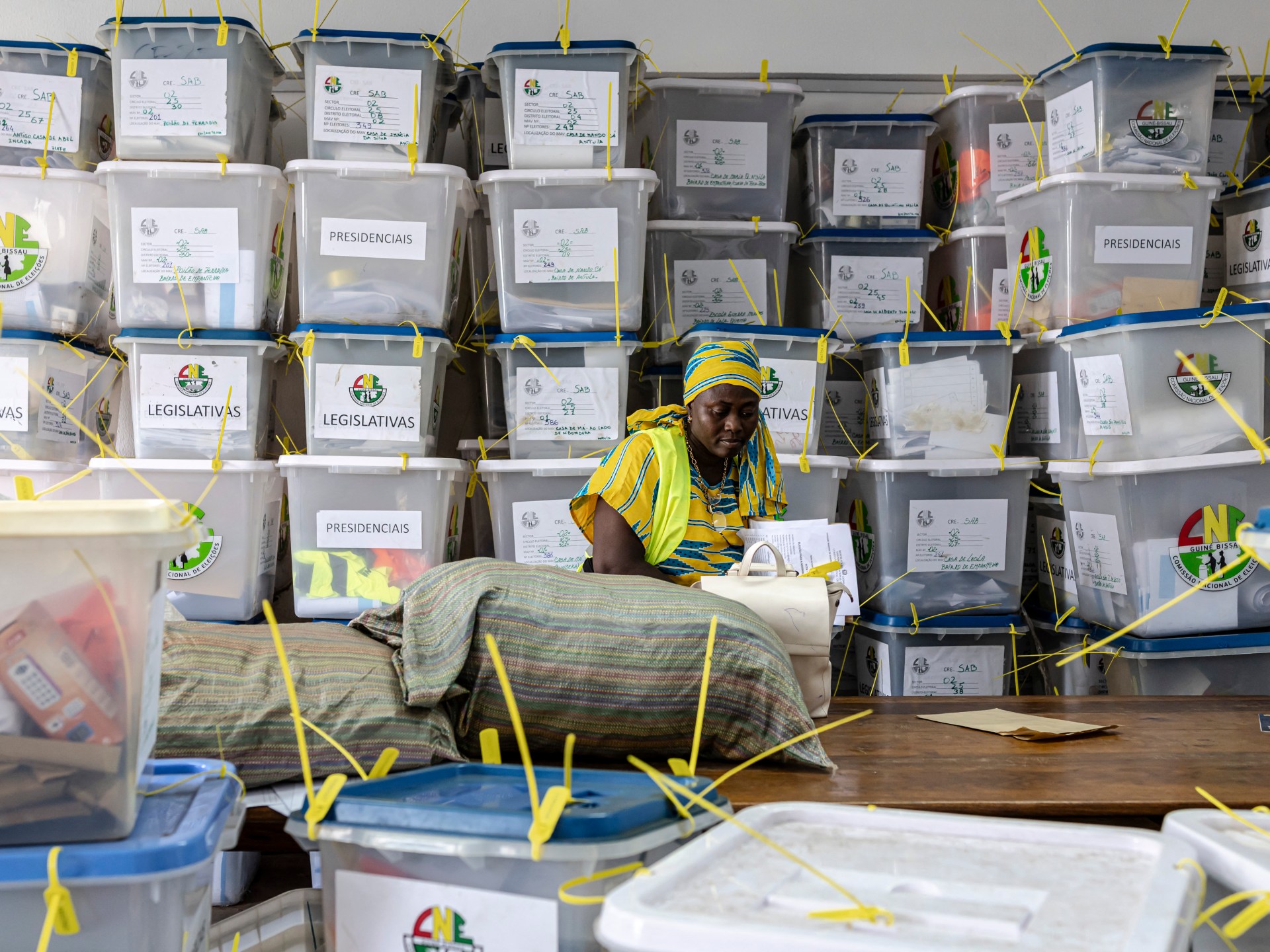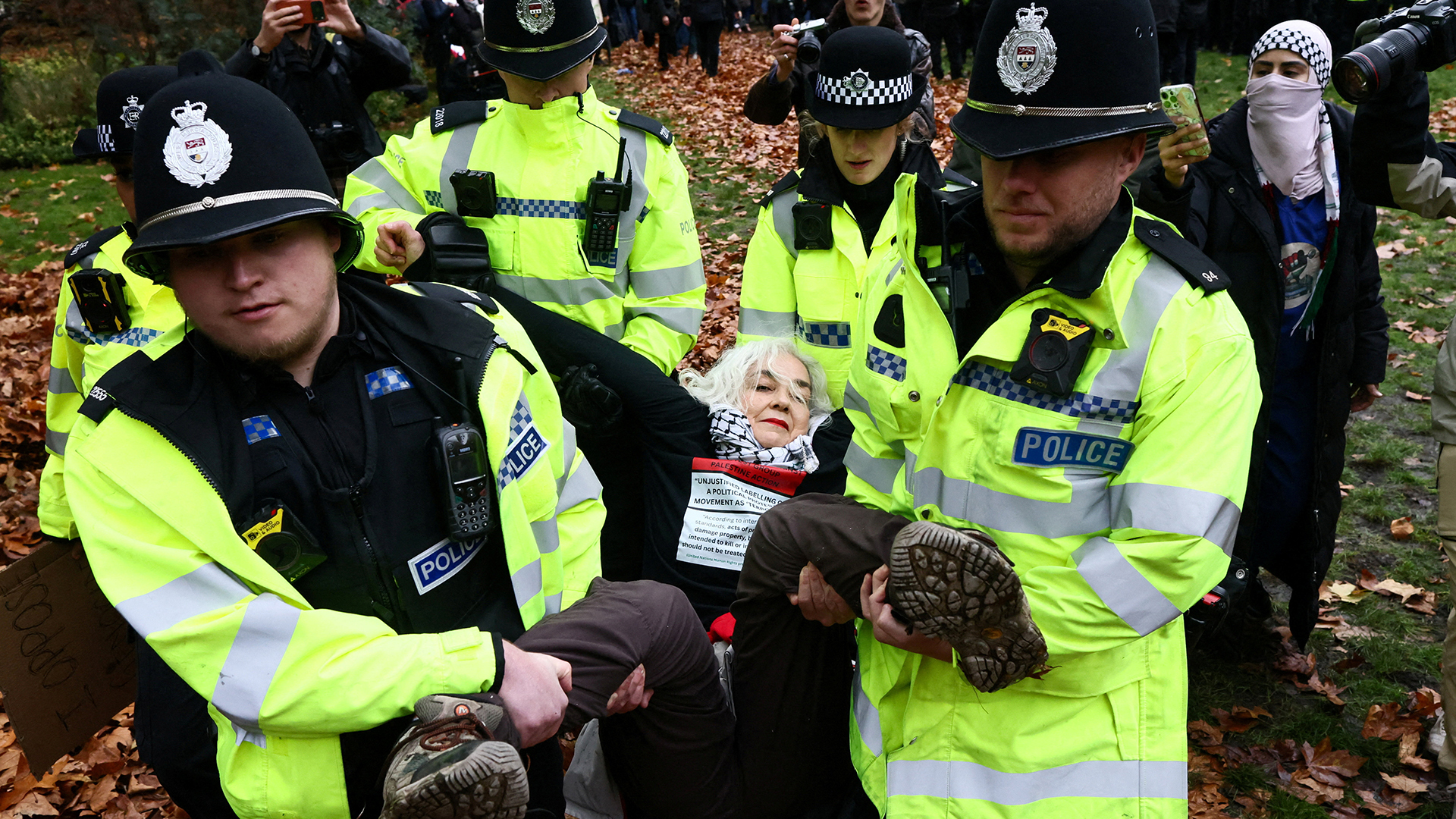After rumors of potential US military action in Venezuela, tensions between the two countries have grown.
Venezuela’s “Cartel de los Soles,” which the US claimed is led by President Nicolas Maduro, was declared a foreign “terrorist” by the US on Monday. Washington has not provided any supporting evidence. Although it is not a coordinated cartel, Venezuelans refer to officials who are involved in corruption.
Following a “potentially hazardous situation” in Venezuelan airspace, the US Federal Aviation Administration issued a warning to several airlines.
Following months of military expansion in the Caribbean Sea as part of US claims to combat narcotics, the advisory was issued. Dan Caine, a top US military officer, has also been traveling to the Caribbean.
Donald Trump, the president of the United States, claimed last month that he had authorized the CIA to conduct covert operations in Venezuela. This highlights how US intervention has historically been conducted in Latin America.
A strike on Venezuelan territory would significantly worsen the months-long US operation there, which has resulted in the deaths of more than 80 people in clashes on boats accused of drug trafficking.
The US actions have been denounced by President Maduro. The alleged drug cartel’s designation as “terror” was described by the Venezuelan government as a “ridiculous lie” on Monday to support “an illegitimate and illegal intervention against Venezuela.”
Trump has stepped up attacks on Venezuela since his White House re-election in January 2025, going against Joe Biden’s lead stance on engaging with Maduro.
However, after leftist former president Hugo Chavez’s ascension to power in 1999, the tensions and distrust between Washington and Caracas date back almost a quarter of a century. Following Chavez’s passing in 2013, Maduro assumed office as president.
Venezuela and the US have been at odds with one another since Trump’s first term as president in January 2025, and this is where Washington has come from since the late 1990s.
- After disputed elections, Maduro is sworn in for a third term on January 10, 2025. The US refutes the outcome, citing recent allegations of election fraud.
- Trump retakes the temporary protected status (TPS) that had protected about 600,000 Venezuelans from deportation in January 2025.
- Venezuela’s Tren de Aragua gang is designated as a “foreign terrorist organization” by the Trump administration on February 20, 2025. Trump would go on to claim Tren de Aragua is Maduro’s front, despite US intelligence officials’ claims that there is no connection between the organization and the Venezuelan leadership.
- Venezuela and Washington come to terms on coordinating their first batch of migrants’ arrivals in Venezuela on February 21, 2025.
- Trump rejects concessions made by his predecessor Joe Biden regarding Venezuelan oil on February 26, 2025.
- Trump imposes 25% tariffs on nations that purchase Venezuelan oil on March 24, 2025.
- US doubles the reward for the arrest of Venezuela’s President Maduro to $50 million, designating him as the “global terrorist leader” of the Cartel de los Soles, on August 8, 2025.
- Washington launches a maritime “anti-narcotics” campaign in the Caribbean and the Pacific on September 2. More than 83 people have been killed in at least 21 alleged “drug boats” attacks.
- Trump confirmed on October 15, 2025, that he had authorized the CIA to conduct covert operations in Venezuela.
- Venezuela suspends a gas deal with Trinidad and Tobago on October 28, 2025, as a result of a US warship visiting them.
- Venezuela launches nationwide military exercises on November 12, 2025.
- US announces “Southern Spear” mission as troops move closer to South America on November 14, 2025.
- US deployment to the Caribbean on November 14 through to November 16 will include the largest aircraft carrier ever built, the USS Gerald R. Ford, warships, tens of thousands of soldiers, and F-35 stealth jets.
- A Notice to Air Missions (NOTAM) is issued by the US Federal Aviation Administration (FAA) on November 22, 2025, warning airlines of risks posed by “heightened military activity,” including GPS interference. Venezuelan flights are suspended by airlines.
Prior to the rise of socialist President Chavez, Caracas and Washington largely maintained economic ties. In the first half of the 20th century, US companies made an investment in the oil sector, and by the 1920s, Venezuela’s oil exports were in the US.
However, Chavez’s nationalization of the oil industry and outcry against US imperial interests in Latin America strained the bonds. In an effort to get the state oil company’s share of all new oil projects, Chavez pushed out US oil giants ExxonMobil and ConocoPhillips in 2007. However, another US oil major, Chevron, is still in business.
A look at Venezuela’s and US ties over the past 25 years is provided:
Chavez assumes office in 1999.
Hugo Chavez, the president of the Bolivarian Revolution, campaigns against an anti-establishment, anti-US platform. Venezuela and the US collided in the wake of his early attempts to rewrite the constitution and later to nationalize the oil industry.
2000s – Escalation and hostility
As Chavez strengthens ties with Russia, China, and Iran, US-Venezuela ties become less and less.
Venezuela expels US-backed diplomats and NGOs and accuses Washington of trying to stoke the country’s instability. Venezuela is criticized by the US for its authoritarian policies and media restrictions.
Chavez’s government expands social initiatives domestically, which are funded by high oil prices, but economic mismanagement and corruption start to thwart growth.
2002 – The coup attempt
Chavez is sacked for 48 hours in a short-lived coup. Venezuela denies that Washington supports the plot, accusing Venezuela of doing so. The catalyst for 20 years of mistrust is this particular incident.
2013 – Maduro’s rise
Maduro, his long-term deputy, narrowly wins the presidency following Hugo Chavez’s passing. His presidency is immediately marred by economic stagnation, corruption scandals, and US-to-US relations that are already in decline.
2014 – 2015 – First major US sanctions
The US imposes sanctions and visa restrictions on Venezuelan officials in response to mounting protests and human rights violations.
Venezuela is at a turning point as a result of sanctions that only make the economy worse and cause severe food and drug shortages. The country’s migration is soaring, and inflation is rising.
2017-2019 – Economic crisis
Venezuela’s financial markets are hampered by US restrictions on debt purchase and by US restrictions on purchasing Venezuelan bonds. As Venezuela’s economy collapses under years of mismanagement and hyperinflation, sanctions on oil imports become more severe. In 2019, inflation peaks at 345 percent. In April 2025, it stands at 172 percent.

Maduro’s disputed re-election in 2018 was won.
A political crisis results from Maduro’s contentious 2018 re-election. The majority of the opposition’s primary candidates were prohibited from running, leading to the boycott of the elections.
Juan Guaido, a figure in the opposition, is elected president interim after receiving support from the US and numerous allies. Venezuela’s oil, gold, mining, and banking sectors are subject to more severe sanctions by Washington.
2024 — A rerun of 2018
In a tense election, Maduro defeated Edmundo Gonzalez, an independent opposition candidate, once more. The opposition disputed the election results announced by election officials in Maduro’s favor, displaying vote tallies from various booths that appeared to indicate a comfortable win for Gonzales. The election’s organization received criticism for how it was conducted.





